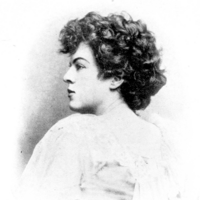Man’s Discontent
White feet half hid in violets, small hands in a burden fair,
A burden of Spring’s first blossoms she wove for her neck and hair
Into wreaths, as she paused a moment on the threshold of maidenhood.
O my child love! hesitating, there I met her as she stood.
So I stayed till I grew weary—man’s discontent, I ween—
Then I thought I longed for Summer, with trees for ever green.
I tired of primrose blossoms and the budding boughs of spring,
And the chirp! chirp! of this year’s birds that had not learned to sing.
I thought her soft arms too slender, and the smooth young cheek too clear,
And the April eyes that loved me too ready with smile or tear,
Too ready to read my wishes in mine that she might obey
Ere I spoke; so in the springtime I went from her arms away.
I sought my love and I found her, when Summer days were long,
All the hedges bright with blossoms and musical with song,
But the eyes that saw me coming no answer to mine would speak;
The lids drooped till the lashes lay dark on her crimson cheek,
The hands I clasped for a moment would but struggle to be free,
As I tried to win her to speak of love, of herself, of me.
‘Hark! the young birds,’ she only said; ‘dost hear them sing in the wood?’
Love’s rosy wings had brushed her eyes as she passed to maidenhood.
So I stayed, but soon grew weary—man’s discontent, I ween—
And I longed for Autumn colours, not trees for ever green.
Cried I: ‘Its sky at sunset is far more fair than this.’
Then I thought, my love’s cheek flushes too ready 'neath my kiss,
That the gentle voice replying spoke love too timidly,
And the shy hands culling blossoms had no caress for me.
I tired of roses’ perfume and the song the wild-birds sung,
So I left her in the noon-time, when Summer yet was young.
‘Neath the sunset skies of Autumn, all the heath-clad hills flushed red;
Sweet the lark his matins singing in the blue sky over-head,
And the languid breeze was perfumed by a rose’s stolen breath;
’Twas the last white bud of Summer that escaped the hand of death,
And my sweet, I feared to meet her for my yesterday of scorn;
Then I flung myself beside her as she knelt amid the corn.
She only said: ’To red and gold grew the green young leaf of Spring.
The rose filled the dead cowslip’s throne; now poppy reigns a king.‘
Then she sighed, with blue eyes tearful and quivering lips that smiled,
‘And to womanhood’s perfection came the promise of the child.
But the rose and cowslip withered, and the poppy’s death is nigh,
For the changing leaf that lingers there remains nought but to die.
Through the bitter winds of Winter let me shelter by thy side;
Prithee, stray not with the Autumn, O my love! unsatisfied.’
So I stayed, but soon grew weary—man’s discontent, I ween—
Of the woods all clad in splendour, rarest red, and gold, and green;
Of the hands that toiling for me pressed the red juice from the vine,
And brought the fragrant peaches that I might not trouble mine;
Of the fawn-like eyes that watched me, ever speaking of their love;
Of the neck I once thought softer than the white breast of a dove.
So I rose up from my resting ere the Autumn days were dead,
And the oak, and beech, and chestnut had not yet their bright leaves shed;
While the birds were singing gaily from their shelter in the thorn,
Still the sleep-bestowing poppies lit their red lamps in the corn.
I sought my love in the Winter, for I sorrowed for the past,
And in the long nights of thinking I knew my own heart at last;
That mine were the imperfections that I seemed in her to find,
That happiness ever beside me made me to sorrow grow blind,
How I of God’s gifts grew weary—man’s discontent, I ween—
That to-day sighs for to-morrow, then to weep for what had been.
She was sleeping when I found her, O my love! in one hand lay
Spring’s young buds and Summer roses with their fair bloom passed away;
But the poison-breathing poppy on her lip was lying red,
Ah! the sleep-bestowing poppy had left me but the dead;
The calm eyes gazing heavenwards could not see the love mine bore,
And the pale brow 'neath my kisses still its marble colour wore;
Till the snow that was not whiter hid the silent face from me—
Hid the lips that could not answer and the eyes that could not see.
Flake by flake came down and hid her from the cold sky overhead.
Thus, having all, I lost all, ere the Winter days had fled.

